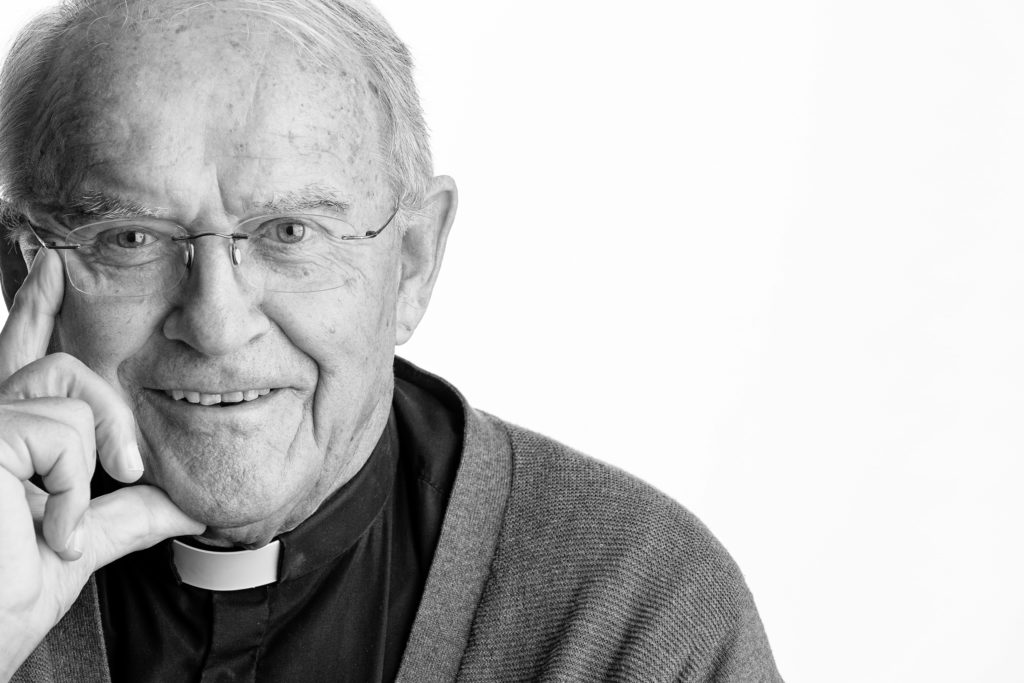 The Rev. Patrick Sheedy, a priest, charismatic pioneer of education and driving force in the ongoing effort to address the homeless issue in Marion County, has established an enduring legacy as a community advocate—and he’s not done yet.
The Rev. Patrick Sheedy, a priest, charismatic pioneer of education and driving force in the ongoing effort to address the homeless issue in Marion County, has established an enduring legacy as a community advocate—and he’s not done yet.
Looking back on his more than 50 years as a spiritual leader and champion for the community, the Rev. Patrick “Father Pat” Sheedy, pastor of Blessed Trinity Parish in Ocala, describes his career as a “happy” one. He felt a call to the priesthood early in his life. One of 12 children growing up in Cooraclare, Ireland, Sheedy originally imagined a different path ahead of him.
Certainty
“We grew up on a farm,” he recalls. “And I love family, so, until I was 17 or so, I said, ‘I’m going to be a farmer.’”
He assumed he’d follow in his father’s footsteps but, when the role of running the family farm went to one of his brothers, Sheedy decided to follow the path of four uncles, who were priests, and three aunts, who were nuns—all of whom had relocated to the U.S. after entering the order. “The question was not whether I was going to be a priest or not,” he offers, “the question was, where.”
At the time, the choice to “serve” a useful purpose rather than pursue wealth through your occupation was the norm in Ireland.
“One of the things that lasted my whole life was my parents’ belief that you help wherever you can. I was brought up in a total faith environment. 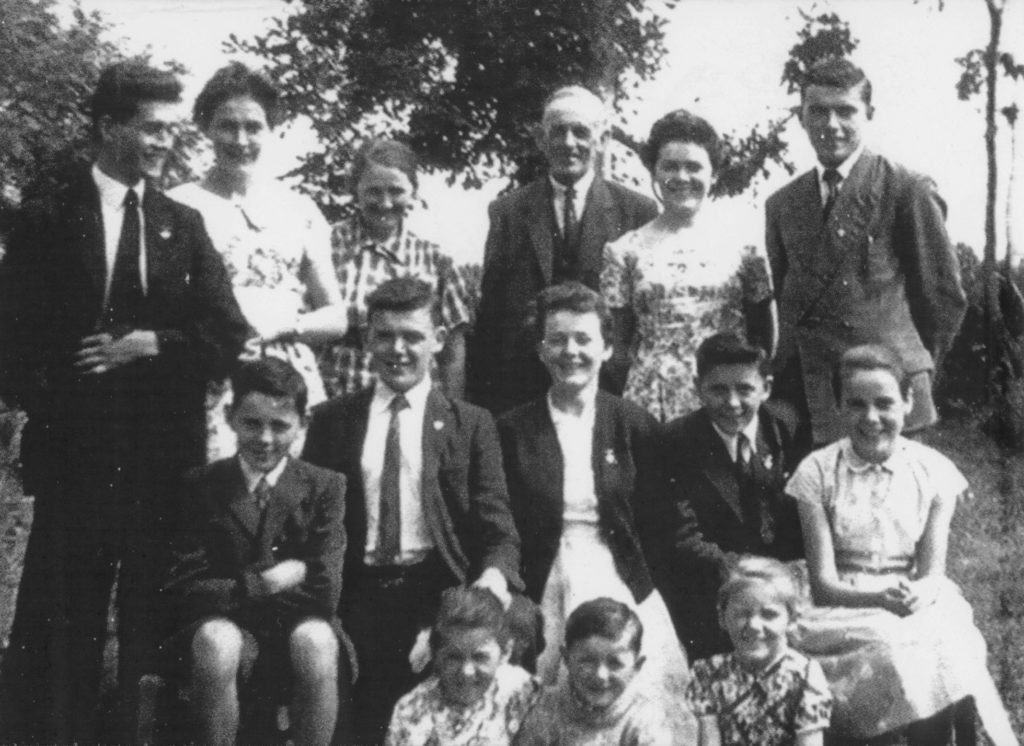 It’s a matter of how you’re going to serve the Lord, as a teacher, social worker or a nun,” he reveals. “It was not a matter of if you were going to serve, just how are you going to serve. When I was growing up, it was natural for parents to say, ‘We’d love for one of you to be a priest or a nun. That would be a big deal for the family.’ Not too many families are saying that these days. We have a bunch of people in the seminary, but we still don’t have enough.”
It’s a matter of how you’re going to serve the Lord, as a teacher, social worker or a nun,” he reveals. “It was not a matter of if you were going to serve, just how are you going to serve. When I was growing up, it was natural for parents to say, ‘We’d love for one of you to be a priest or a nun. That would be a big deal for the family.’ Not too many families are saying that these days. We have a bunch of people in the seminary, but we still don’t have enough.”
He believes the focus has shifted to ambition for personal wealth and that is why families do not necessarily encourage their children to enter religious service the way they once did.
“I think the culture is telling us the only way to success is how much money you can make,” he asserts. “Money is important, but it’s not the top. They used to say that money was the root of all evil. Now, according to a Harvard University study, they say, ‘No, money can be the way to happiness depending how you use it.’ Money is not the root of all evil, it’s just the way you use it.”
Sheedy’s constant companion in life seemed to be certainty in his chosen path. “I’ve always thanked God that I never had a struggle with whether I should or I shouldn’t,” he says of his choice to enter the priesthood.
Choices
As was the custom for Irish children, he left home for boarding school around the age of 14.
“I had already made the decision before I went that I would attend seminary after school,” he says. He signed up “on the spot” when a priest from Lake City came looking for recruits with a simple pitch: “We need help.”
His reasoning for choosing Florida was more about the present opportunity than a master plan.
“I didn’t want to stay in Ireland…too many priests,” he confides. “But I wasn’t necessarily thinking about America. I had always liked to travel. I would have gone to South America or South Africa or Africa. That would have been my instinct, but I didn’t have the guts to do that.”
As to why he would have preferred one of those places, he replies, “The harder the mission, the greater the pull.”
He entered the seminary at 18 and attended St. Patrick’s College, near Dublin, for six years.
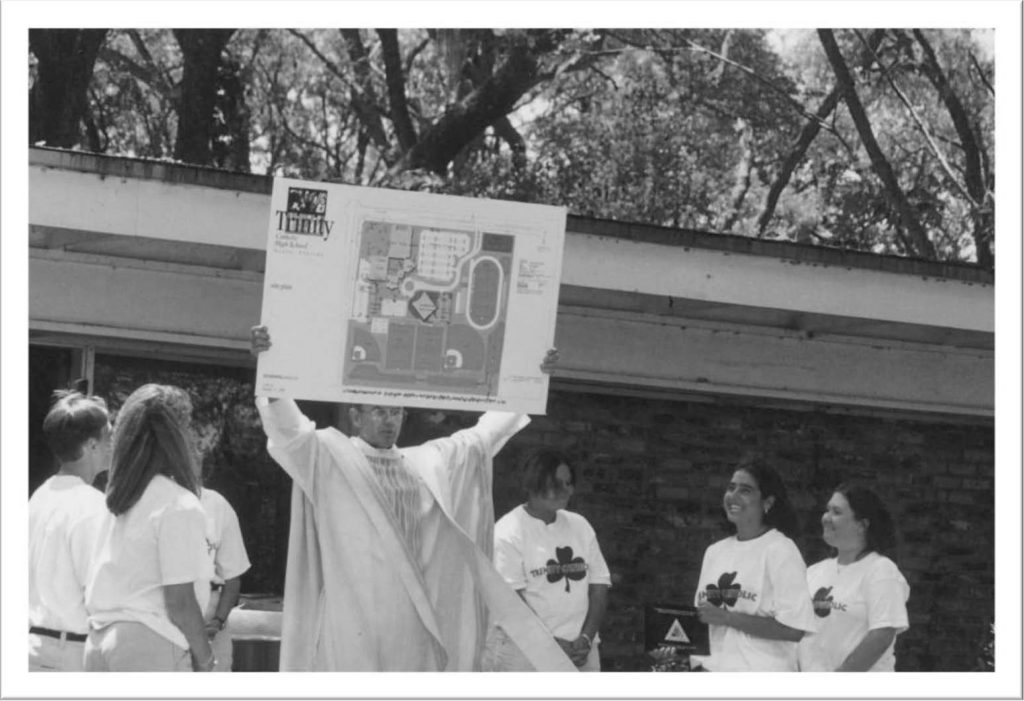 “I’ve always been a very quiet, ‘stay in the background’ kind of person. I’m an introvert. But I was always being pushed. I didn’t have the guts to say no, so I went along,” he says of taking a leadership role. “When I was in high school the dean invited me to be head (Head boy and head girl are roles of prominent student responsibility.),” he remembers. “You would have to ask for privileges for the student body. So, I would go up and ask for a free day and my knees would be knocking, but I’d still ask.”
“I’ve always been a very quiet, ‘stay in the background’ kind of person. I’m an introvert. But I was always being pushed. I didn’t have the guts to say no, so I went along,” he says of taking a leadership role. “When I was in high school the dean invited me to be head (Head boy and head girl are roles of prominent student responsibility.),” he remembers. “You would have to ask for privileges for the student body. So, I would go up and ask for a free day and my knees would be knocking, but I’d still ask.”
At seminary, he was cast in a similar role, which may have helped prepare him for the position he occupies today.
“When you went to the seminary you were given a number from 1 through 40 or something. Whoever got 1 was class president. The staff selected you,” he explains. “I got 1. And I’ve no idea how to this day. So I was class president for seven years. No choice.”
At 24, Sheedy and his brother Michael were both ordained to the priesthood in County Clare, Ireland, on June 13, 1965, which fell on the same day as their parents’ wedding anniversary.
Given that his aunts and uncles had left Ireland as teenagers and had not returned for 20 to 30 years, some not at all, his parents were understandably saddened by his departure.
“My mother said, ‘We won’t see you for years.’ And I said, ‘No, I’ll be home every year,’” he shares. “She thought I was just making her feel good. I’ve been home every year since but, with COVID-19, except for this year.”
Charity
Sheedy has served in a number of parishes and schools throughout the state, first teaching in Bishop Kenny High School in Jacksonville, and coming to Blessed Trinity in 1988. He played an instrumental role in the founding and building of Trinity Catholic High School and has used his platform to promote community through such initiatives as Perpetual Adoration, a ministry that continues over 25 years later; day care and elder care services; and various programs under the parish’s Brother’s Keeper ministry to address the needs of the underprivileged and homeless populations in our area.
He also established La Guadalupana Mission medical and dental clinic, which recently opened a new venue, and a mission church in Uganda.
“I go to Uganda every year,” he says. “We have a parish over there that has close to 40,000 people. We’ve built 30 churches over there. We’re building 15 schools and they’re flocking to them.”
Sheedy’s enthusiasm is tangible and, at 80 years of age, his goals are as ambitious as ever.
“He is a man of great vision and also of great energy to match that vision,” says Archbishop of Miami Thomas Gerard Wenski. “He dreams big, but he also has the talent to bring those dreams to reality.”
Community
Sheedy is a stalwart advocate for the destitute and displaced of our community and the driving force behind the progress that has been made in recent years.
“It goes very much with the most recent encyclical from Pope Francis, Fratelli Tutti or Brothers All,” Sheedy explains. “There are people objecting to the title, but he’s using it because Saint Francis of Assisi used it. Yes, it should be Brothers and Sisters All and that is what it means.”
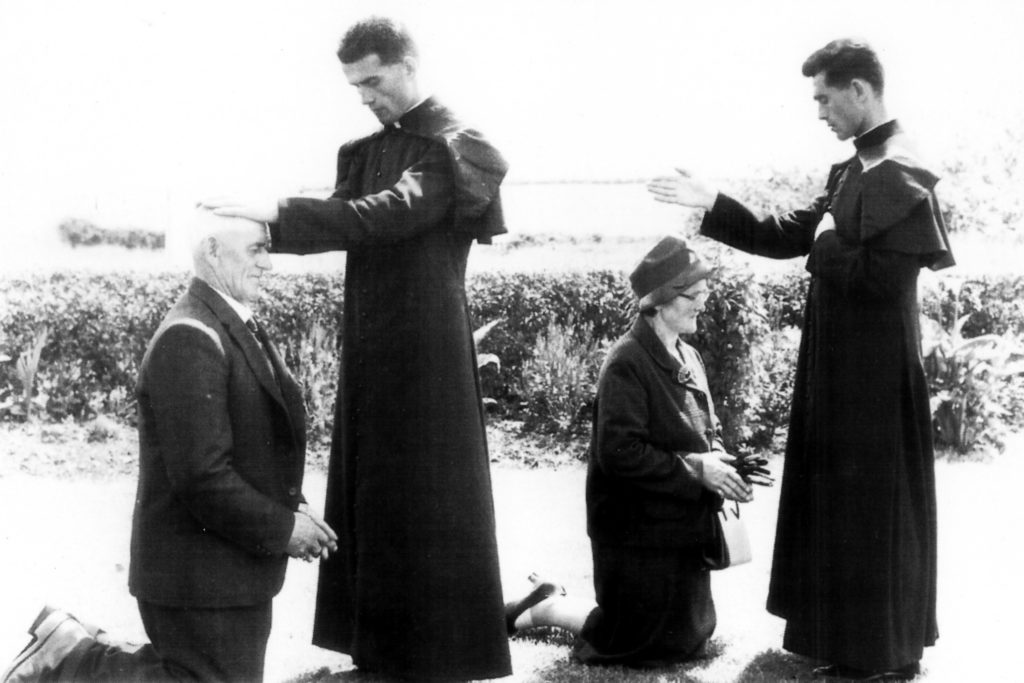 In the directive to Catholics and world leaders, Pope Francis writes: “Let us dream, then, as a single human family, as fellow travelers sharing the same flesh, as children of the same earth, which is our common home, each of us bringing the richness of his or her beliefs and convictions, each of us with his or her own voice, brothers and sisters all.”
In the directive to Catholics and world leaders, Pope Francis writes: “Let us dream, then, as a single human family, as fellow travelers sharing the same flesh, as children of the same earth, which is our common home, each of us bringing the richness of his or her beliefs and convictions, each of us with his or her own voice, brothers and sisters all.”
“That is my philosophy in life,” Sheedy shares. “Everyone has dignity no matter who they are and nobody in the world can rob you of your dignity. Francis deals with it in Chapter 2 of the Good Samaritan story. Who was my neighbor?” he continues. “That basically is where I come from. Who has a need and I can respond to it. That’s who the neighbor is. We’ve always helped the homeless here, but it bothered us that our efforts were just a Band-Aid. It’s not just me. A bunch of us—we’ve always had a desire to help the chronic homeless. How about helping them settle?”
He feels passionately that this is an issue not only for the church, but also for the larger community, including local businesses.
“I would hope that more and more of the business community would see that it would help their business to help the homeless. I know a lot of homeless people will always be homeless. But I also know there are a certain percentage of them, if they got help, they would take it.
“So, we’ve made at least four attempts. We’ve been beaten down three times. We had some successes, like Project Hope and Open Arms. Saving Mercy came later. We got beaten down on all those. They would always tell me, ‘Wonderful idea, right cause, but it’s the wrong place.’ What do you call those people? NIMBYS—not in my backyard. They would say, ‘You’re bringing homeless into our area,’ and we would say, ‘No, we’re taking homeless out of your area and they’re not going to be homeless anymore.’ But they never bought into it,” he recalls. “People have a hard time understanding that you’re taking homeless people off the streets. But, eventually, we found a hotel that was already zoned, so nobody could fight us. Which is now Mercy Inn. So that’s how we’re there. We have big plans. I mean it’s slow, but if the cause is right, you gotta stick with it.”
The 10-acre site’s RV park currently houses formerly homeless clients, but the motor inn was recently demolished to make way for new duplex units, which will cost $50,000 each.
“Eventually, when it’s fully developed, we could be helping up to 100 people at a time,” he reveals.
His drive to help is only exceeded by his focus, according to those who know him best.
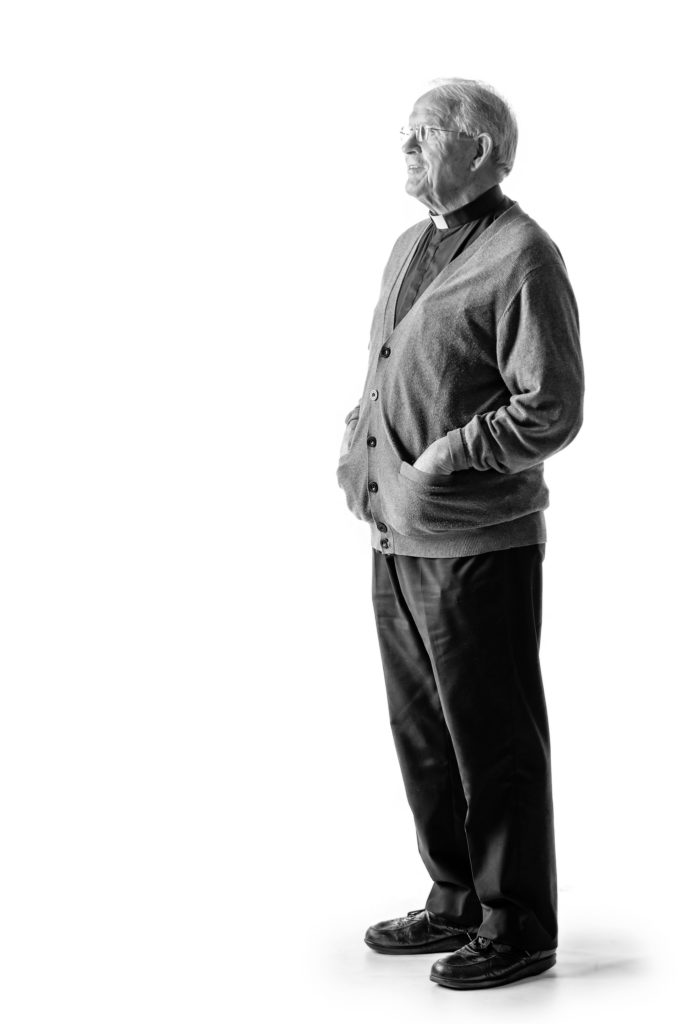 “I have known Father Pat for more than 25 years. I also have served in many committee capacities throughout that time frame with the church as well as in the community,” explains Saving Mercy board member Jim Hilty Sr. “Father Pat is the most focused person I have met in trying to transform this community, here and also in Uganda. He is always trying to improve the relationship of the underprivileged or people that just need some help. His business mind has not only helped the Blessed Trinity parish, but has also provided him the ability to help the community.”
“I have known Father Pat for more than 25 years. I also have served in many committee capacities throughout that time frame with the church as well as in the community,” explains Saving Mercy board member Jim Hilty Sr. “Father Pat is the most focused person I have met in trying to transform this community, here and also in Uganda. He is always trying to improve the relationship of the underprivileged or people that just need some help. His business mind has not only helped the Blessed Trinity parish, but has also provided him the ability to help the community.”
Sheedy credits the project’s board for the progress they have made. “They’re a great group,” he says. “There are five or six of us trying to raise the money to get the building project going. It’s just a matter of doing it. We don’t have any setbacks.”
Sheedy explains that, much like the fundraising he did for La Guadalupana Mission, he is working to find sponsors for the homes.
When asked what the timetable is for completion of that project, he playfully replies, “God’s time. If you put a time on it, then you can get frustrated.”
He had a similar experience when he was seeking funding for La Guadalupana, which serves the local migrant worker population.
“I wrote to all the farmers for that one. To buy the land and clinic cost $580,000,” he explains. “I’m a shy guy, but I’m not afraid to ask for money if needed. I can ask anyone and people will give me money, not for me personally…but for the cause, and I’ll take it.”
When I was starting the high school, that’s 22 years ago now, one guy said, ‘It ain’t gonna work. Ocala’s not ready for that.” I said, ‘OK.’ and moved ahead,” he continues. “Eventually he came back in without me asking him and gave me $10,000.”
While one imagines you’d need to be tough to navigate the challenges and resistance Sheedy has faced, he has instead been described as a steady drip of water that carves a stone.
“No, I don’t think it’s about being tough, but you just have to persevere,” he offers. “I love working with boards. I think we have about 12 boards in the parish. I have an endowment board, a finance board, the Brothers Keeper board, the Trinity Catholic board and an elder care board. I have a little church up in Citra, Christ the King, and at the Spanish church we have boards there too,” he continues. “I go to all the board meetings. I can go to a meeting and see if they’re going off course and bring ‘em back. I always say, ‘Well who’s doing that? Who’s doing this?’ So I think I’m good at that kind of thing. If someone comes up with a good idea, ‘Yeah, yeah…you’re on the committee.’ I love boards because I love to delegate. Some people are micromanagers. I’m the opposite, and it might take longer to get something done, usually does take longer with volunteers, but you have to keep pushing. People are great and they like to see results.”
At the suggestion that he splits his time between the role of business leader and spiritual leader, he is quick to counter, “I don’t separate the two. To me, everything is spiritual. If it isn’t spiritual, I shouldn’t be doing it. So everything is spiritual.”
Care
When discussing the recent statement from Pope Francis, featured in the documentary “Francesco,” which premiered at the Rome Film Festival in October, the Pope said, “Homosexual people have the right to be in a family. They are children of God. You can’t kick someone out of a family, nor make their life miserable for this. What we have to have is a civil union law; that way they are legally covered.”
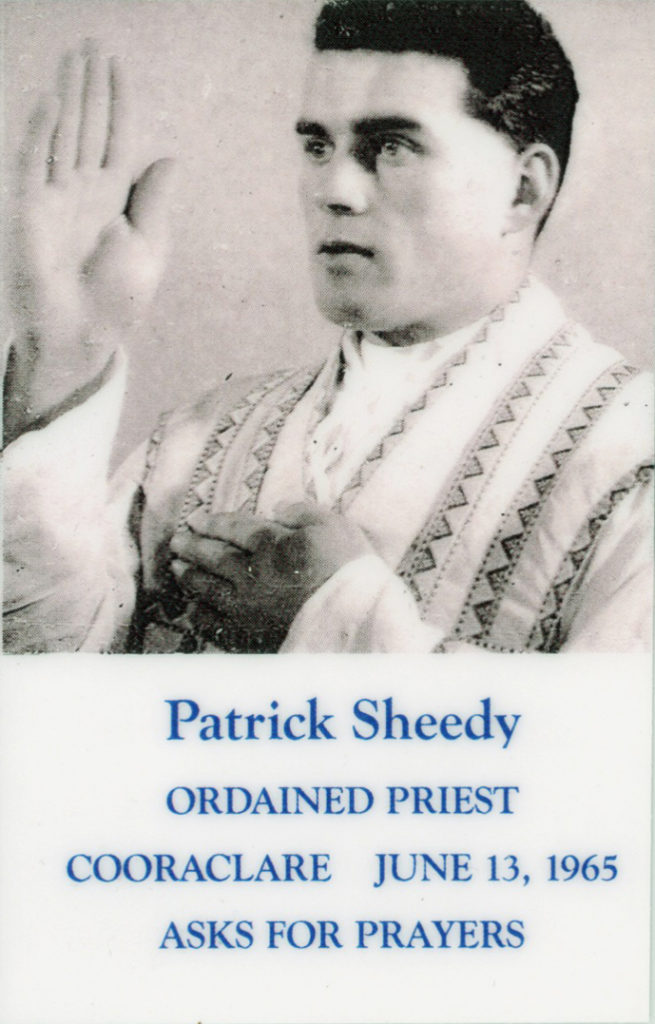 Sheedy reflects on his own experiences ministering to gay, lesbian and transgender individuals and then offers, “That’s why I like the Pope’s encyclical. He’s pastoral. He’ll take care of anyone anywhere anytime. I think while we have our differences, we’re all the same when it comes to who is my neighbor. And that doesn’t mean just our neighbors in Ocala. What about all the other people? I can’t change people’s minds, but I can change what we say as a church. God loves all people individually.”
Sheedy reflects on his own experiences ministering to gay, lesbian and transgender individuals and then offers, “That’s why I like the Pope’s encyclical. He’s pastoral. He’ll take care of anyone anywhere anytime. I think while we have our differences, we’re all the same when it comes to who is my neighbor. And that doesn’t mean just our neighbors in Ocala. What about all the other people? I can’t change people’s minds, but I can change what we say as a church. God loves all people individually.”
He acknowledges some division in the church and the interpretation of the scripture. “If you’re a right wing Catholic, you’re looking by the book. They’re in every religion. Fundamentalists. Unfortunately, some Catholics buy into that. But they are misinterpreting scripture because it’s convenient. Which they not only do on that issue, but on loads of issues,” he offers. “You’ve got to be open.”
His concern is tangible as he considers how divided the country is currently, “It’s tough stuff. People are in camps now. And they don’t hide it,” he offers. “I worry about how we can get back together. If people would just use the Pope’s message as the basis, we’d all be on the road to at least respecting each other.”
“My family has been a part of Blessed Trinity since before I was born,” shares parishioner Vianca Torres, who also attended Blessed Trinity and Trinity Catholic schools. “Father Pat showed kindness to all and did his best to spread awareness on the needs of the community while finding solutions to the issues at hand. As many of us students went on with life, Father Pat has somehow still remembered us from our time at school. He actually takes the time to catch up and see where life has taken us.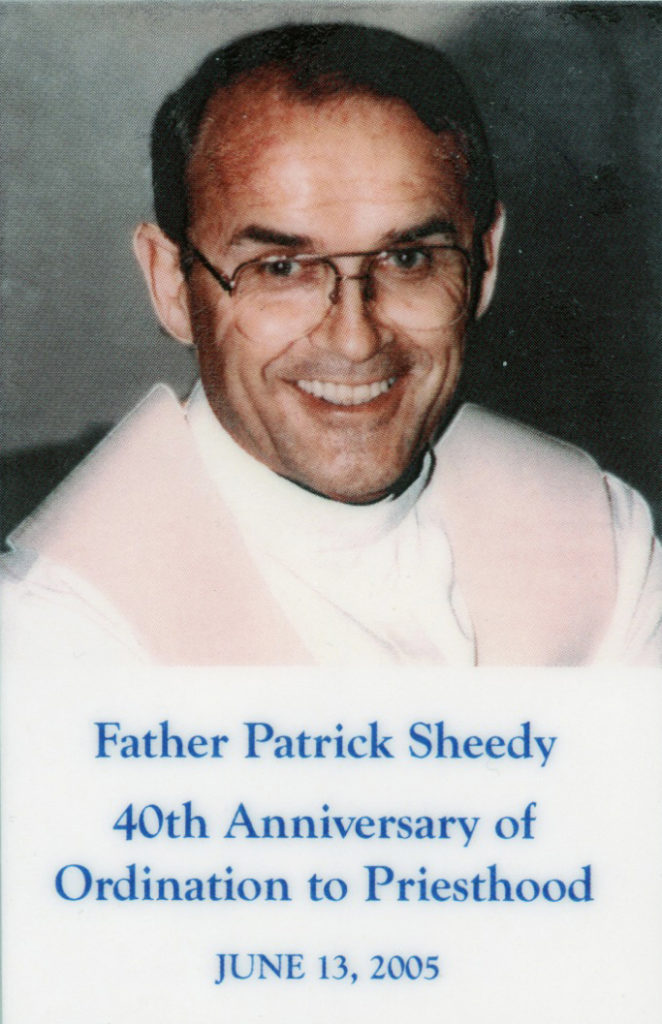 His kindness is something that cannot be overlooked. He’s been one of the biggest influences in my life when it comes to community advocacy and giving back through our time, talent and treasure. Life as a Blessed Trinity parishioner simply wouldn’t be the same without Father Pat’s leadership. He is a true inspiration and force in our community.”
His kindness is something that cannot be overlooked. He’s been one of the biggest influences in my life when it comes to community advocacy and giving back through our time, talent and treasure. Life as a Blessed Trinity parishioner simply wouldn’t be the same without Father Pat’s leadership. He is a true inspiration and force in our community.”
Sheedy’s life has been built on connections, near and far, cultivated over time and composed of colleagues, former parishioners, extended family and friends made during his extensive travels.
“One of the big things about my life is that I’ve always stayed in touch with people,” he explains. “Unless they drop me. But I never drop them.”
He regales us with tales of doggedly hunting down long lost relatives and reestablishing lasting bonds, how while studying in England, he and another young seminarian irritated a woman whose lawn they trampled while ministering door to door.
“It’s kind of a neat story,” he offers with a chuckle. “She came out and said, ‘How dare you! What are you here for?’ So on and so forth. We were shy, but eventually we struck up a friendship. We’ve visited back and forth over the years. They were at my brother and sister’s weddings. That was 58 years ago and, to this day, the daughter still writes to me.”
When asked what advice he would give his 25-year-old self, Sheedy replies, “Stay open.”
“You never know where you’re gonna be led. You don’t have to have vision for the next five years or 10 years, just go where God leads you and stay open,” he urges. “A lot of people box themselves in, and then a lot of good things that could have happened don’t because they’re not open.”
And his advice to any young people considering the same path?
“If God calls you and you’re listening, you will be successful, you will be fulfilled and you will be happy,” he offers. “You have to immerse yourself into the priesthood and then you will be happy. That’s why I can’t retire, because I’m happy. To me, I’m not working. This is kind of a hobby. So, what would I do if I give up my main hobby?”






